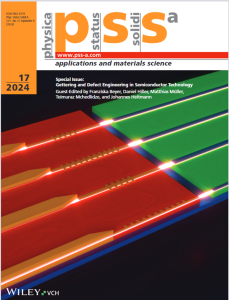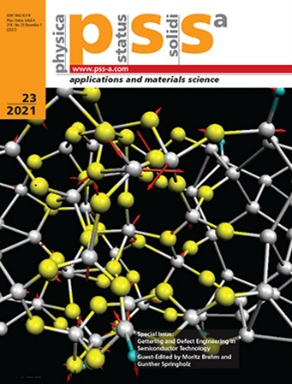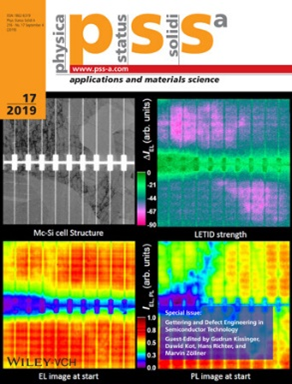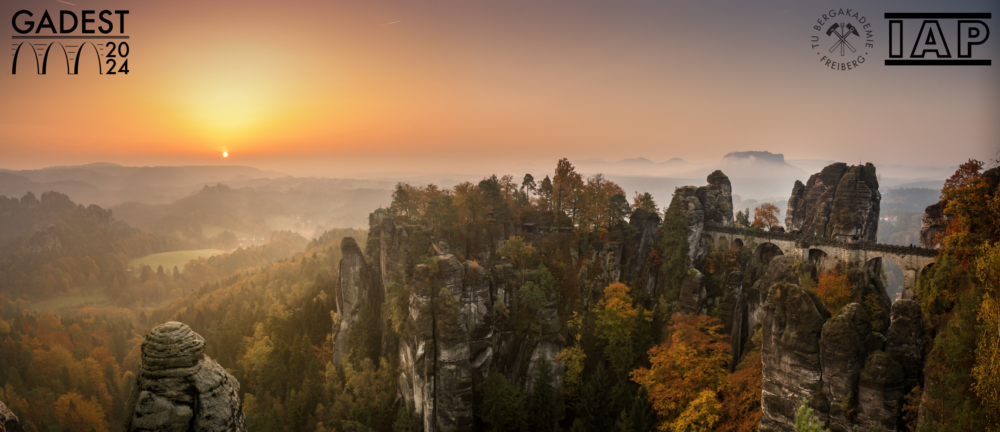Special Issue in physica status solidi (a)
 Gettering and Defect Engineering in Semiconductor Technology (GADEST 2024)
Gettering and Defect Engineering in Semiconductor Technology (GADEST 2024)
Guest Editors: Franziska Beyer, Daniel Hiller, Matthias Müller, Teimuraz Mtchedlidze, and Johannes Heitmann
We are happy to announce that the Special Issue is now online!
Only for reference, you can still find the detailed information on the submission process below:
Dear GADEST 2024 presenters,
Once again, it is planned to publish a special issue in physica status solidi (a) – applications and materials science (pss (a)) related to the “International Conference on Gettering and Defect Engineering in Semiconductor Technology” (GADEST 2024). In collaboration between the Guest Editors and the pss Editorial Office we cordially invite you again to submit a Review Article (topical review, for invited speakers) or a Research Article based on, or related to, your presentation.
The physica status solidi journals are designed to reach a broad audience in the field of condensed matter and materials physics. pss is one of the largest and well-established publication platforms in solid state physics – now over 60 years in business – and is widely accessible as part of many institutional site licenses, evidenced by more than one million article downloads annually.
The publication will be a regular special issue, not a conference proceedings. Articles must fulfil the typical standards and requirements of the journal. Acceptance of a contribution for presentation at the conference based on the abstract submission is mandatory, however, it does not automatically guarantee inclusion of the publication in the Special Issue.
All submitted manuscripts will undergo peer review. According to the editorial policy of pss, two positive recommendations by independent referees are a prerequisite of acceptance. Peer review and publication occur on individual manuscript basis. Published in Wiley Online Library Accepted Articles and Early View shortly after acceptance, your article is citable with DOI or article number immediately; hence there is no waiting for the remainder of the contributions. When all articles are complete, they will be assigned to the monthly issue of pss (a). Please note that we cannot guarantee to include your article in the Special Issue if we receive it after the above given deadline.
Please refer to the guidelines received from the symposium organizers and the author instructions available on the pss homepage → Author Guidelines (including Word template and LaTeX style files and the link to online submission through Editorial Manager).
Please mention the GADEST 2024 special issue in your cover letter and select the appropriate section/category Gettering and Defect Engineering in Semiconductor Technology (GADEST 2024) to expedite handling.
We look forward to receiving your contributions!
Guest Editors: Franziska Beyer, Daniel Hiller, Matthias Müller, Teimuraz Mtchedlidze, and Johannes Heitmann
pss Editors: Marc Zastrow, Stefan Hildebrandt
Information on submissions:
Research Articles expose original and previously unpublished work of general interest to the community. Manuscripts do not have a strict length limit (typical lengths vary from 6 to 10 journal pages). Articles must fulfil the standards and requirements of the journal. Main criteria for consideration by pss (a) are:
- Relevance and novelty of the topic match expectations for a regular journal paper.
- The general quality of the manuscript and the amount of information provided is appropriate for an international journal. Serial or incremental, pure self-referential and lab-report-style work is discouraged.
- Main results have not yet been published (also not in conference proceedings) and are not under consideration for publication elsewhere.
- Please make sure not to copy content from (even your own) previous publications. All submitted manuscripts will be processed through the iThenticate text verification system.
Reviews should provide an overview of a current topic in the format of a topical review of about 10-12 (max. 15) journal pages. Due to this length restriction, a complete bibliographic overview on the existing literature cannot be expected but referencing should be well-balanced. The manuscript should represent a snapshot of most recent progress, the state of research and particularly relevant aspects, with focus on the highlights and possibly open or controversially discussed questions. They are intended to inform an audience not immediately familiar with the specific topic. Original, previously unpublished results may also be included to a certain extent.
Benefits for pss authors include:
- No page charges or publication costs for authors
- Modern article formats (PDF, Enhanced PDF, HTML, Enhanced Article for mobile devices)
- Supporting information, e.g. additional data, figures, videos or animations can be published online
- Author suggestions for journal cover figures or frontispiece pages, especially for Review Articles
- pss is indexed in Web of Science and all other major abstracting databases
- Promotion of selected content via web portals, e.g. Advanced Science News, newsletters, and press releases
- Open Acess option compliant with national/funder mandates, supported by many countries/institutions
See recent related publications:
 GADEST 2022:
GADEST 2022:
eds. Moritz Brehm, Gunther Springholz
Part II: Phys. Status Solidi A 2022, 219, No. 17 (DOI 10.1002/pssa.v219.17)
Part I: Phys. Status Solidi A 2021, 218, No. 23 (DOI 10.1002/pssa.v218.23)
 GADEST 2019:
GADEST 2019:
eds. Gudrun Kissinger, Dawid Kot, Hans Richter, Marvin Zöllner
Phys. Status Solidi A 2019, 216, No. 17 (DOI 10.1002/pssa.v216.17)
Pictures © pss
